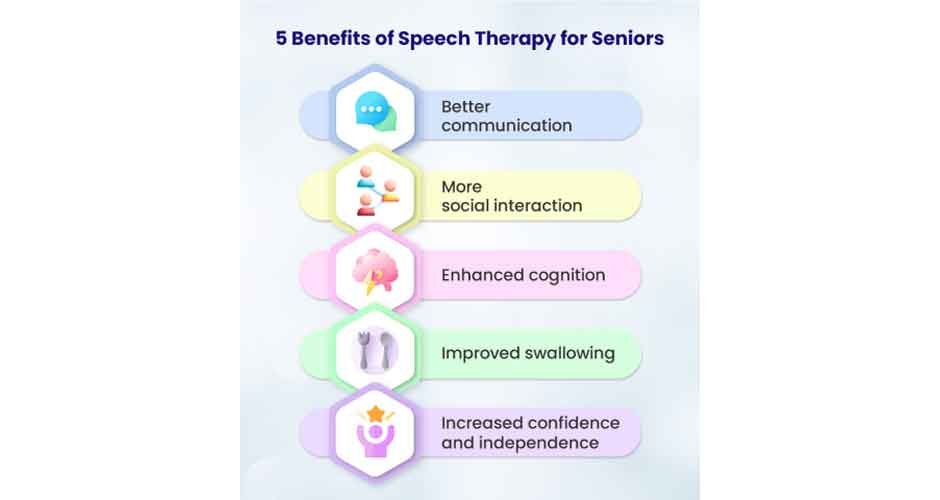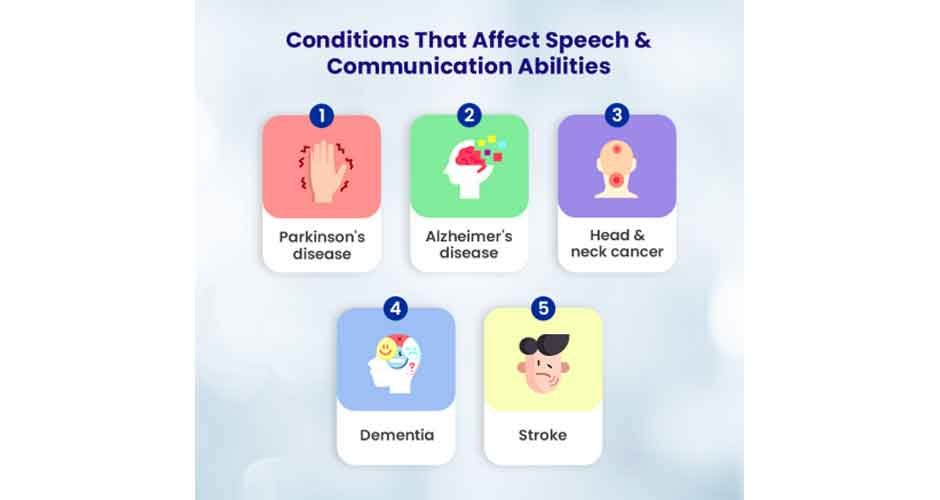For many people, the concept of speech therapy is all about children working with specialists to improve their speech, pronunciation, or overcome speech impediments. However, speech therapy is a valuable solution for people of all ages, especially seniors who may experience speech difficulties due to age or illness. Communication is crucial at any stage in life, and speech therapy can help seniors connect with loved ones and communicate in an emergency.
What Is Speech Therapy?
With age, seniors may face challenges with verbal communication and swallowing, making it harder for them to connect with their loved ones. However, speech therapy can help seniors overcome these obstacles. Speech therapy is a specialized treatment that aims to improve an individual’s ability to communicate effectively, as well as their ability to swallow and feed.
Speech therapy for adults is a highly beneficial treatment involving various techniques and exercises tailored to the individual’s specific needs and goals. One of the primary benefits of speech therapy is improving communication skills, which can significantly impact seniors’ ability to connect with their loved ones. Additionally, speech therapy can also help address swallowing difficulties and reduce the risk of aspiration pneumonia. By improving communication and swallowing abilities, seniors can experience greater independence, better quality of life, and improved overall health outcomes. So, if you or a loved one is experiencing communication or swallowing difficulties, don’t hesitate to seek out the services of a qualified speech therapist on the advice of your provider.
Benefits of Speech Therapy for Seniors

1. Improved communication skills:Communication is essential for maintaining social connections, expressing needs and desires, and navigating everyday tasks. However, aging and certain medical conditions lead to speech and language difficulties, such as slurred speech, difficulty pronouncing certain sounds, and trouble finding the right words to express their thoughts. One of the primary benefits of speech therapy for older adults is improved communication skills. Speech therapy can improve speech clarity, voice volume, fluency and increase vocabulary and sentence structure.
2. Increased social interaction: Seniors can often experience feelings of isolation and loneliness as their physical capabilities may slow down with age, leading to decreased social interactions.And speech difficulties can make socializing even more challenging, as seniors withdraw from activities they once enjoyed. Senior care services,including speech therapy, can provide seniors with strategies to improve their communication skills and increase their social interaction. Speech therapists can work with seniors to practice conversational skills, such as turn-taking, listening, and responding appropriately. They also help seniors improve their speech clarity, making it easier for others to understand them.
3. Enhanced cognitive abilities: Speech therapy can help seniors enhance their cognitive abilities by providing targeted exercises and strategies. By engaging in speech and language exercises, seniors can improve their memory, attention, and problem-solving skills, positively impacting their overall cognitive function.
4. Improved swallowing and feeding:Speech therapy can help seniors who have dysphagia, or difficulty swallowing. A common problem that can lead to choking, malnutrition, and dehydration, especially among those who have experienced a stroke or other medical conditions. Seniors with dysphagia can improve their ability to swallow safely and efficiently with personalized exercises and techniques provided by speech therapists. This may include muscle-strengthening exercises or learning proper head and neck positioning during meals to reduce the risk of choking. By seeking speech therapy services, seniors can regain their ability to eat and drink with confidence, improving their overall health and quality of life.
5. Increased independence and confidence: Speech and language difficulties can significantly impact seniors’ ability to perform everyday activities, leading to a loss of independence and confidence. Speech therapy can help seniors regain confidence and independence by improving communication skills and addressing swallowing difficulties.
How Speech Therapy Can Help Seniors with Specific Conditions

Appropriate speech therapy may be prescribed depending on whether the condition is aphasia (difficulty speaking, understanding, reading, or writing language) or dysarthria (difficulty speaking due to weak or uncoordinated muscles). It also benefits seniors with specific conditions that affect speech and communication abilities, such as the following:
1. Stroke: According to a study, about 75 percent of strokes occur in people 65 or older and are the third leading cause of death among Americans. Stroke can cause various communication difficulties. Speech therapy can improve communication skills, such as speech clarity, language comprehension, and swallowing, by providing exercises and using techniques such as augmentative and alternative communication (AAC) devices. The speech therapist at the senior care servicescan also help stroke survivors regain their cognitive abilities, such as memory and attention, which may have been affected by the stroke.
2. Parkinson’s disease: This can cause speech and communication difficulties, including slurred speech, soft voice, and monotone voice. Speech therapy can help seniors with Parkinson’s disease improve their speech clarity, volume, and intonation, through exercises. It helps strengthen the muscles used in speech, and techniques such as Lee Silverman Voice Treatment (LSVT). It is an intensive, high-effort exercise to improve speech clarity, volume, and intonation. Seniors or their caregivers can ask their primary care physician or medical clinicfor a referral to a speech therapist who has experience working with patients with Parkinson’s disease.
3. Dementia: This causes communication difficulties, such as difficulty finding the right words, repeating words or phrases, or losing the ability to communicate completely. Speech therapy can help seniors with dementia by improving their communication abilities for as long as possible through exercise and strategies. It also helps to reduce frustration and confusion related to communication difficulties.
4. Alzheimer’s disease:Just like dementia, Alzheimer’s causes various communication difficulties, including difficulty in finding the right words, repeating words or phrases, and losing the ability to communicate altogether. Speech therapy can help seniors with Alzheimer’sdisease maintain their communication abilities for as long as possible through exercises and strategies promoting language skills and memory. It can also address swallowing difficulties and reduce the risk of aspiration pneumonia. When seniors have difficulty swallowing, there is a risk that food or liquid may enter the lungs, which can lead otherwise lead to aspiration pneumonia.
5. Head and neck cancer: Due to the location of the cancer and the treatments used to treat it, head and neck cancer can affect speech and swallowing abilities. Speech therapy can help seniors with head and neck cancer regain their speech and swallowing abilities through exercises and techniques that improve muscle strength and coordination and through AAC (Augmentative and Alternative Communication) devices if necessary.
4 Ways to Find the Right Speech Therapist
Finding the right speech therapist for seniors is essential in improving their communication skills and quality of life. Here are some ways to find a suitable speech therapist:
1. Ask for Recommendation:Ask primary care physicians or senior care service professionals who have experience in working with seniors. They may be able to refer a speech therapist specializing in adult speech therapy.
2. Researching online: Another way to find a speech therapist for seniors is to research online. Many online resources, such as professional associations and directories, can provide information on local speech therapists. Before deciding, reading reviews and testimonials from other patients and their families is important.
3. Check credentials and experience: When considering a speech therapist for seniors, it is important to check their credentials and experience. Look for therapists licensed and certified by recognized professional organizations, such as the American Speech-Language-Hearing Association.Additionally, look for therapists who have experience working with seniors and with the specific conditions their experiencing, such as stroke, Parkinson’s disease, or dementia.
4. Schedule a consultation:Finally, it is important to schedule a consultation with the speech therapist before beginning therapy. During the consultation, the therapist can answer any questions and concerns and provide information on their treatment approach and goals. It helps seniors and their caregivers decide whether the therapist fits their needs.
Finding the right speech therapist may take some time and effort, but it can greatly affect seniors’ ability to communicate effectively and maintain their independence.
Conclusion
Speech therapy for adults is a highly beneficial treatment for seniors. Contact Elite Care’s Florida medical clinic professionals to learn about senior care services and qualified speech therapists. Seniors and their caregivers should not hesitate to seek out the services of a qualified speech therapist. With the help of a skilled speech therapist, seniors can overcome their communication and swallowing difficulties and enjoy a fuller, more satisfying life.






